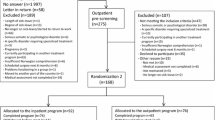Abstract
The study investigates whether changing jobs is related to work-related well-being of people with musculoskeletal impairments. In order to assess this relationship subjects who began new jobs after rehabilitation (N=52) were compared with subjects who returned to their former employment (N=63). Work-related well-being was measured by means of the scales “job satisfaction” and “need to recover after work.” After controlling for individual characteristics (gender, age, working hours per week, and pain complaints) and job characteristics (job demands and decision latitude), job satisfaction could be predicted by job change. Recovery need after work was predicted by pain complaints, job demands, and decision latitude, but not by job change.
Similar content being viewed by others
References
Hearne PG, Employment strategies for people with disabilities: A prescription for change.Milbank Q 1991; 69 (Suppl 1/2): 111–128.
Merens-Riedstra HR.Leven zonder werk (Living without work). Deventer: Van Loghum Slaterus, 1983.
Sociaal en Cultureel Planbureau.Enige aspecten van arbeid in de toekomst (Some aspects of work in the future). 's Gravenhage: Staatsuitgeverij, 1986.
Walker A, Townsend P.Disability in Britain: A manifesto of rights. Oxford: Martin Robertson,1981.
Verkley HGM,Langdurige wekkloosheid: Bevindingen van een 2-jarige follow-up (Long term unemployment: Results from a 2-years follow-up). Amsterdam: Swets & Zeitlinger, 1988.
Lahelma E. Unemployment and mental wellbeing: Elaboration of the relationship.Int J Health Serv 1992;22: 261–274.
Bränholm IB, Eklund M, Fugl-Meyer KS, Fugl-Meyer AR. On work and life satisfaction.J Rehab Sci 1991;4: 29–34.
Hörnquist JO, Zar M, Hansson B. Precursors of repeated short-term sick-leave: An empirical review of some background, job and wellbeing characteristics.Scan J Soc Med 1993; 21: 164–170.
Karasek R, Theorell T,Healthy work. Stress, productivity and the reconstruction of working life. New York: Basic Books, 1990.
Furda J, Meijman T. Druk en dreiging: Sturing of stress. In Winnubst JAM, Schabracq MJ, ed.Handboek arbeid en gezondheid psychologie (Pressure and threat: Control or stress. Handbook of Psychology of Work and Health). Utrecht: Lemma, 1992, pp. 127–144.
Yelin E, Meenan R, Nevitt M, Epstein W. Work disability in Rehumatoid Arthritis: Effects of disease, social and work factors.Ann Intern Med 1980; 93: 551–556.
Fifield J, Reisine ST, Grady K. Work disability and the experience of pain and depression in rheumatoid arthritis.Soc Sci Med 1991; 33: 579–585.
Oel CJ van, Meijman TF, Berg BMC van den, Berg DMTh van den, Oort-Marburger D, Schmidt SH. The Impact of job characteristics on work-related wellbeing of handicapped employees, in relation to pain.Clin Rehab 1993 (submitted).
Schmidt SH, Ekeren C van, Scholten L.Revalidatie en arbeid (Rehabilitation and work). Amsterdam: Institute of Social Medicine University of Amsterdam, 1988.
Oort-Marburger D, Schmidt SH, Berg BMC van den, Berg DMTh van den, Meijman TF.Non-responsie in een onderzoek naar effecten van arbeidsrevalidatie (Non-response in a study on the effects of vocational rehabilitation). Amsterdam: Research Institute of Work and Health/Institute of Social Medicine University of Amsterdam, 1992.
Pope AM, Tarlow AR, eds.Disability in America: Toward a national agenda for prevention. Washington DC: National Academy Press, 1991.
Mokken RJ, Lewis C. A nonparametric approach to the analysis of dichotomous item responses.Appl Psych Meas 1982; 6: 417–430.
Hogervorst PAM.Welbevinden in het werk en de relatie met werkdruk en autonomie (Work-related wellbeing in relation to job demands and decision latitude). Amsterdam: Facutly of Psychology University of Amsterdam, 1992.
Oel CJ van Berg BMC van den, Berg DMTh van den Meijman TF, Oort-Marburger D, Schmidt SHHet activiteiten en vaardigheden profiel (The Activities and Proficiencies Profile), Amsterdam: Research Institute of Work and Health/Institute of Social Medicine University of Amsterdam, 1992.
Meijman TF, Noord F van, Hellinga P, Gloerich F, Dormolen M van.Workload of driving examiners: A construction of scales. Groningen: Faculty of Psychology University of Groningen, 1985.
Warr PB, Decision latitude, job demands, and employee wellbeing.Work & Stress 1990; 4: 285–294.
Reisine ST, Grady KE, Goodenow C, Fifield J. Work disability among women with rheumatoid arthritis.Arthritis Rheum1989; 32: 538–543.
Festinger L. Cognitive dissonance. InReadings from Scientific American: Contemporary Psychology. San Francisco: WH Freeman and Company, 1971.
Groenestijn MAJ van. Artikel 30 Ziektewet een (on)bruikbaar instrument (Article 30 of the Sickness Insurance Law an (in)effective instrument).SMA 1991; 46: 374–381.
Harmsen-Alkema J, Noz M, Werken tijdens de ziektewetperiode bevorderen door samenwerking van verzekeringsgeneeskundige en behandelend arts (Promoting work for individuals receiving sickness benefit by the cooperation between the physician and the health insurance consultant).Ned Tijdschr Geneesk 1992; 136: 1920–1922.
Bandura A. Self-efficacy: Toward a unifying theory of behavioral change.Psychol Rev 1977; 84: 191–215.
Author information
Authors and Affiliations
Rights and permissions
About this article
Cite this article
Schmidt, S.H., Meijman, T.F., Scholten, A. et al. Factors contributing to job satisfaction following rehabilitation for musculoskeletal impairments. J Occup Rehab 3, 213–222 (1993). https://doi.org/10.1007/BF01097431
Issue Date:
DOI: https://doi.org/10.1007/BF01097431




